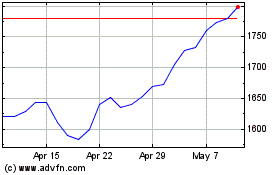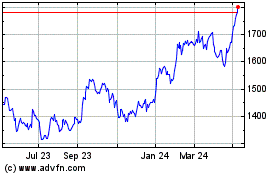Glaxo Study: Cervarix Immune Response Tops Gardasil's
May 08 2009 - 2:30AM
Dow Jones News
GlaxoSmithKline PLC's (GSK) Cervarix vaccine induced a higher
immune response in women against the virus that causes cervical
cancer than Merck & Co.'s (MRK) Gardasil, according to a
Glaxo-funded clinical trial.
However, the study didn't measure which vaccine was more
effective at preventing actual cases of cervical cancer or
pre-cancerous lesions - that would require a longer and larger
trial. Both vaccines are designed to prevent infection by human
papillomavirus, or HPV.
Nevertheless, U.K.-based Glaxo hopes the results, to be
presented at a Swedish medical conference that begins Friday, will
help give Cervarix a competitive edge if it reaches the U.S.
market, which Merck has had to itself since Gardasil's launch in
2006. The U.S. Food and Drug Administration is reviewing Cervarix
and could decide whether to allow it to go on sale by autumn.
Cervarix is already on the market in other countries including the
U.K.
"The study clearly shows a higher level of immune response in
women receiving Cervarix than Gardasil," Gary Dubin, vice president
of global clinical development in Glaxo's vaccine unit, told Dow
Jones Newswires in an interview.
Before knowing the final data, a Merck executive played down the
importance of comparing the vaccines' immune responses. "It's
disease efficacy that's really the most important, and we certainly
have very high efficacy against some very important disease
endpoints," said Rick Haupt, program lead for HPV vaccines in
Merck's research arm.
In clinical studies tested against placebo, Gardasil's efficacy
rates approached 100% at preventing cervical cancer or
pre-cancerous lesions that were caused by the four HPV types
targeted by Gardasil. (However, there are other HPV types not
targeted by Gardasil that can cause disease, and Gardasil isn't
approved in the U.S. to protect against these types.)
Gardasil is marketed in most major European countries by Sanofi
Pasteur MSD, a joint venture of Merck, Whitehouse Station, N.J.,
and France's Sanofi-Aventis SA (SNY).
Glaxo launched the head-to-head trial in the U.S. in 2007 in
more than 1,100 women ages 18 to 45. The vaccines were given in
three shots over six months. According to Glaxo, the women who
received Cervarix had higher levels of "neutralizing antibodies,"
which help fight off cancer-causing HPV types, than Gardasil, one
month after the last dose. For one type, the levels induced by
Cervarix were more than twice as high as Gardasil and for another
type they were more than six times higher, according to figures
provided by Glaxo.
Glaxo said both vaccines had "acceptable" safety profiles, but
rates of certain symptoms such as injection-site reactions were
higher among Cervarix users. Both vaccines have been linked to
headache and fainting.
The vaccines are designed differently. Cervarix has a
proprietary additive known as an adjuvant, which Glaxo believes
enhances its effectiveness, while Gardasil uses a more conventional
adjuvant. Gardasil targets four HPV types including those that
cause most cases of genital warts, while Cervarix targets two types
and isn't intended to provide as much protection against warts.
Merck's Gardasil sales rose quickly after its 2006 U.S. launch
but last year declined 5% to $1.4 billion as the company
encountered difficulty convincing women ages 19 to 26 to get the
shots. Gardasil sales recorded by Sanofi Pasteur MSD, however,
jumped more than 70% to about $780 million.
Merck is trying to expand Gardasil's usage by seeking FDA
approval for its use in women up to age 45 (it's now approved for
9- to 26-year-olds), and in males for the prevention of genital
warts and rare cancers. Glaxo isn't seeking an indication in
males.
Glaxo recorded $231 million in Cervarix sales last year.
Glaxo is set to present other data supporting Cervarix,
including potential evidence that it offers some protection against
additional HPV types, and that its immune-response levels last for
at least 7.3 years after vaccination. Merck previously had data
suggesting Gardasil could protect against additional HPV types but
the FDA declined to incorporate this into the prescribing
label.
Separately, Merck is presenting data showing an experimental
precursor to Gardasil, a vaccine targeting just one HPV type, had
sustained efficacy for an average of 8.5 years after vaccination.
In another study, Gardasil reduced the number of abnormal Pap tests
and subsequent procedures designed to ward off cervical cancer. Pap
tests screen for cervical cancer.
-By Peter Loftus, Dow Jones Newswires; 215-656-8289;
peter.loftus@dowjones.com
Gsk (LSE:GSK)
Historical Stock Chart
From Apr 2024 to May 2024

Gsk (LSE:GSK)
Historical Stock Chart
From May 2023 to May 2024
